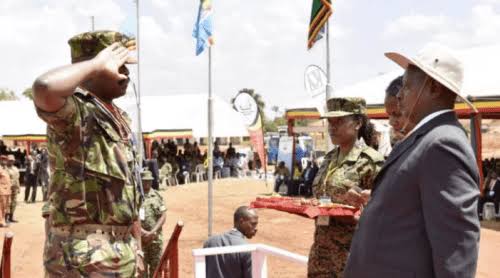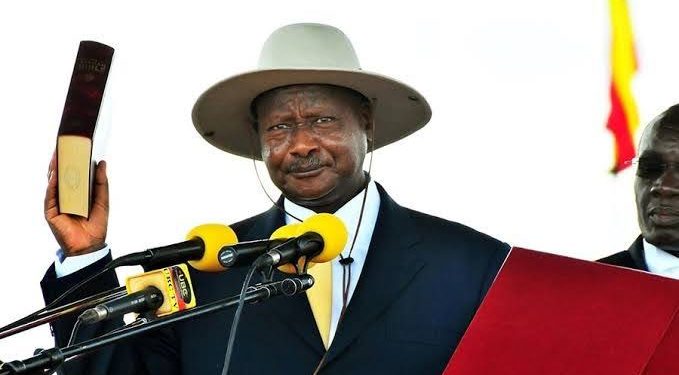By CHANGE OF GUARDS
Immediately following the 2021 general elections, this website asserted that it marked the final appearance of Uganda’s military dictator on the ballot box. It further posited that instead, his son, Gen. Muhoozi, would ascend to the presidency of Uganda. Since then, we have consistently provided periodic and accurate updates on his son’s journey to the presidency. Our most recent update was in response to the launch of the so-called Army Establishment, wherein we predicted that it served as a precursor to the son’s eventual assumption of command of the army before assuming the presidency of Uganda. For those who opt to disregard our analysis, they do so at their own peril and anguish.
Museveni is facing immense pressure to relinquish his 38-year hold on power. This pressure emanates from the opposition, certain factions within his own regime, and the international community at large. Currently, he stands as one of the foremost and longest-serving African heads of State. He is acutely aware of the high likelihood of either dying in office or being forcibly removed, with potentially dire consequences. On a personal level, he aims to craft a false legacy by creating the impression that he voluntarily left office. However, he is engaged in a desperate struggle to maintain his indirect grip on power through proxies. This explains his significant investment in ensuring that his son, Gen. Muhoozi, inherits the presidency of Uganda.

With the recent formal appointment of his son as the army chief, the scheme is steadily approaching its final stage. Museveni envisions supervising the transition of the presidency to his son and overseeing his initial tenure in office. Consequently, he is considering stepping down one year or less before 2026. He is confident that once his son has fully consolidated his influence over the army and the entire security apparatus, he can safely make his exit from the political stage.
The arrangement is provided for in Article 105(4) of the Constitution of Uganda, wherein the President can resign by submitting a written notice to the Chief Justice. Furthermore, according to Article 109, in such an event, the Vice President assumes office as the Acting President until fresh presidential elections are held within six months. Consistent with Article 109(3), his strategy is to circumvent midterm elections by planning to step down when his remaining term is one year or less.
His primary focus at present is to find ways to neutralize and diminish the influence of certain troublesome military generals. Additionally, he must overhaul his current cabinet lineup and establish a more youthful one that aligns with his son’s vision. The ongoing public service reforms and restructuring of Ministries, Departments, and Agencies (MDAs) are part of this endeavor. With his son firmly entrenched in the security sector, Vice President Jesca Alupo would serve merely as a figurehead Acting President.
Ultimately, a few months before the 2026 general elections, his son will retire from the army and contest the presidency. The opposition, whose campaign revolves around Museveni’s lengthy tenure in power, will face a daunting challenge in rebranding their message.
As is customary, the security forces will play a significant role in the electoral process, and his son will be declared the victor. This will allow Museveni to continue governing the country through his son until death do them part. Thus, he will secure the legacy of a democrat and statesman who voluntarily relinquished power.
INFORMATION IS POWER AND THE PROBLEM OF UGANDA IS MUSEVENISM







Discussion about this post